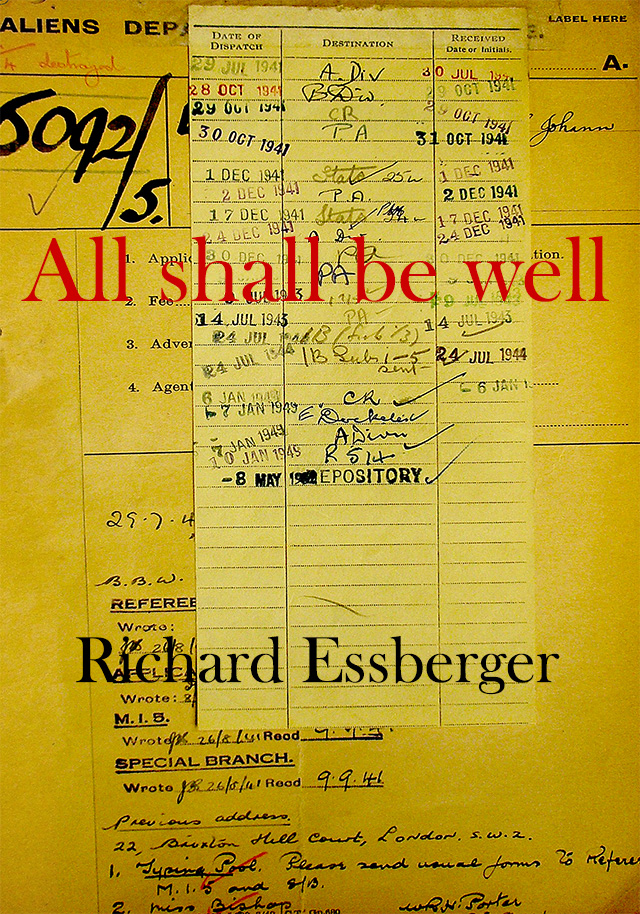
by Richard Essberger
In 1938 Mary, a young Englishwoman in London, meets Josef, an anti-Nazi Austrian refugee who has escaped from Vienna to Prague. They fall in love.
Josef, unknowingly, carries a deadly secret. In 1934, during the Austrian Civil War, as a member of the Schutzbund, the Austrian Social Democrat’s paramilitaries, he had witnessed in the Vienna Woods a young Englishman taking orders from a Soviet NKVD general.
After the German invasion of Austria in 1938 he is betrayed to the Gestapo (by his own mother, no less) as a member of the underground. He escapes by night, on foot, across the border to Prague. Then, after the Munich Agreement, with the Nazi grip tightening on Czechoslovakia, he escapes again by train and ferry via Poland to London, assisted by the Quakers and Czech military intelligence (who soon thereafter helped set up the famous Kindertransport rescue trains).
In 1940 Josef is interned and shipped to Canada, despite MI5 – for whom he is working – trying to prevent this. Letters in both directions take three months and both are wracked by doubt… ‘Has he survived the U-boats?’ ‘Has she survived the bombs?’ ‘Does he, does she, still love me?’ Released, Josef returns in early 1941 to London in the middle of the Blitz. Soon, in Brixton, they marry.
For the third time he joins the Czech Army and is later trained by SOE. But then, out of the blue, his ‘unknown’ secret catches up with him. In MI5’s wartime headquarters in Blenheim Palace he sees the man he first saw in 1934 in the Vienna Woods. Yet neither his MI5 controller nor, at first, Mary, believes him when he says this man, Philby, is a Communist.
In 1950 Josef takes Mary and their daughter by train – the Arlberg Express – to meet his family in Vienna, where Russia is one of the four allied occupying powers. At Semmering, in the Alps, an NKVD lieutenant and Red army soldiers attempt to drag him off the train…
But that’s enough, let’s not give the ending away. Not least because it’s hard to know what to make of it, readers will make up their own minds.
– 440 pages
– Size: 25 x 17.6 cm
– Paperback
ISBN ( Paperback ) : 978-1-912-728-66-4
ISBN ( E-Book ): 978-1-912-728-67-1
‘I found it all very interesting, evocative, and confirming the stories I had heard from my mother.’ Alison Cadbury Senter, Tessa Rowntree’s daughter
‘I was gripped from the beginning, particularly the part referring to my dear Aunt Tessa.’ Kathy Bailey, Tessa Rowntree’s niece
‘It didn’t take long to become engrossed, since it is easy to read and is clearly heralding a compelling story ... I also feel that the author’s approach is clever and adds to the “reader experience” ... There is an extraordinary amount of detail in such a wide range of subjects, but the key is that the narrative was, for me, extremely readable.’ General Sir Nick Parker, KCB, CBE, formerly Commander Land Forces; founder and Chairman of RE:ACT, a charity that is designed to respond to crises abroad
‘The diary style reminded me of Grossmith. I loved the official report/clippings/diary style mixture, with longer accounts vs. the short sentences and snappy retellings of events. It makes for an absorbing experience. I was truly compelled by the narrative and how it unfolded. Young Josef is an engaging and congruent character who I really enjoyed getting to know. I hope others find the same.’ Alice Roberts
‘Don’t faint! Finally finished reading, feeling completely bereft and in floods of tears!! What a read, wonderful. SO enjoyed it.’ June Fairgrieve
‘Thank you for this precious book! It is historical documentation and a piece of art, rooted in a family saga... My favourite scene, the “Cucumber polka”... You have brought the (in)glorious past to life; it is no longer closed for 100 years but open for eternity.’ Peter Heilig, in Vienna
‘A hugely enjoyable read... Mary and Josef sound like forces of nature!’ Sarah Dawnay
‘How moving I found it as a story... not least the approach with which Mary tackles polio... I sense that ill health didn't define her approach to life or to the world... I liked the style and the injection of reports and letters; it was fascinating and I liked it as a device, it shows the story from different angles simultaneously... Hearing me read parts out loud my husband asked, “Is it a play?” Well, no... but perhaps it should be...’ The Reverend Canon Eleanor Rance
‘Beautiful. If it had been published in November 2022 I’d have bought 25 copies for my Christmas presents.’ Teresa Beese
ESSBERGER ![]() 2002—2026
2002—2026